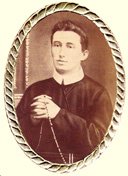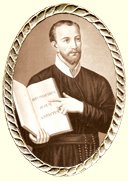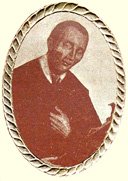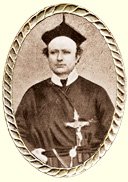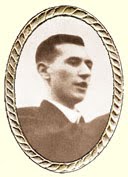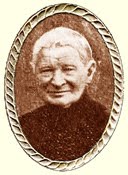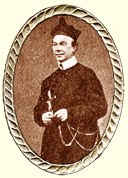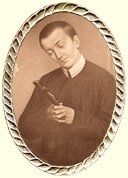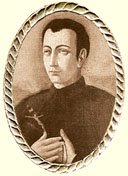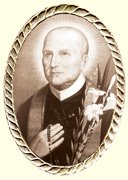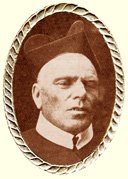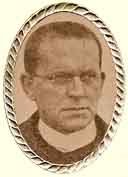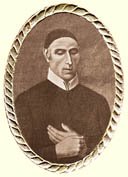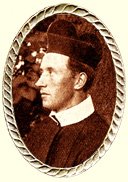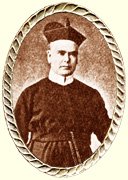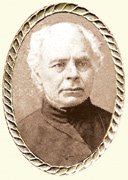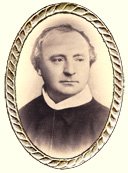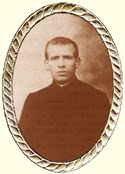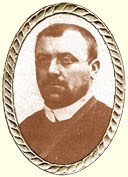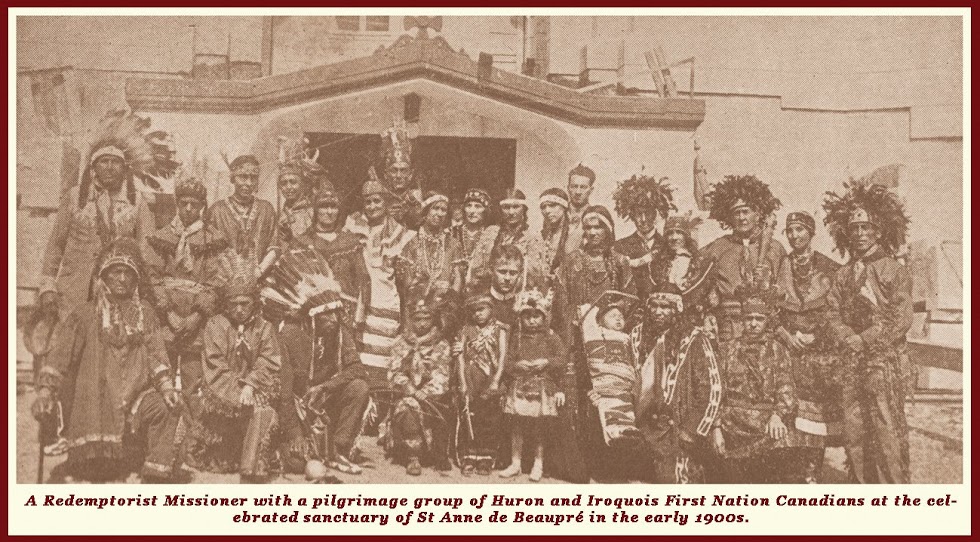Sunday, 14 October 2012
Friday, 2 December 2011
Very Rev. Fr Achilles Desurmont, C.SS.R. (1828-1898)
 We will attempt to sketch here a few outlines of the life of him who may be regarded as the ‘maker’ of the Gallo-Helvetic Province, of which he was the seventh Provincial for nearly a quarter of a century (1865 to 1887 and again in 1898). Born at Tourcoing, in the diocese of Lille, France, on 23rd December 1828 into a very honourable family of industrialists, the Very Rev. Father was one of the most brilliant students of the college of this city. He completed his studies with the Jesuits at Brugelette (Belgium). His Redemptorist vocation was providentially recognized by Venerable Fr Joseph Passerat. He was a man with a spirit fertile in resources, an exuberant nature, a lively and spontaneously exuberant character and very great faith.
We will attempt to sketch here a few outlines of the life of him who may be regarded as the ‘maker’ of the Gallo-Helvetic Province, of which he was the seventh Provincial for nearly a quarter of a century (1865 to 1887 and again in 1898). Born at Tourcoing, in the diocese of Lille, France, on 23rd December 1828 into a very honourable family of industrialists, the Very Rev. Father was one of the most brilliant students of the college of this city. He completed his studies with the Jesuits at Brugelette (Belgium). His Redemptorist vocation was providentially recognized by Venerable Fr Joseph Passerat. He was a man with a spirit fertile in resources, an exuberant nature, a lively and spontaneously exuberant character and very great faith.We may say that he was destined by Providence to become the worthy successor of Ven. Fr Passerat, as he, himself, had been of St Clement Mary sent by St Alphonsus to propagate the Institute over the Alps. His eminent virtues recommended themselves to the confidence of his superiors. Professed on 19 March, 1851 at St Trond, Belgium, and ordained priest on 24 September 1853 at Metz, he was soon named prefect of his former co-students, in which capacity he perfected their studies with a remarkable skill and directed the students with a zeal which sought nothing but to be moderated.
For 11 years he was occupied with the formation of young persons and did not leave this work but to fill, for 22 years, the office of Provincial. Under his government vocations multiplied and 20 new monasteries were opened in France and Spain and as far as South America in Peru, Chili, Columbia and Ecuador.
He permeated his province with the spirit of St Alphonsus. One of his principal merits was to encourage to solid and substantial studies, but an encouragement always conformable to the teachings of St Thomas and St Alphonsus. An admirably gifted man of doctrine, he wished to shed light on the road on which he engaged his subjects and wanted solid convictions to be applied to the effort required for the sacrifices that he asked. That which he never ceased to teach and to recommend was the Rule, but the Rule well understood and the Rule in all its fullness. His acts of government were all marked with prudence and goodness. A great vigor, and firm and wise meekness, a gentle persuasion were his invariable methods of his administration. Hatred of mediocrity and above all tepidity was, for him, as a milestone of which he never lost sight and towards which he directed his efforts.
During the last years of his life Very Rev. Fr Desurmont himself published several books and quite a number of pamphlets. These found their way into all truly pious hands. It will suffice to recall the following titles: The Friend of the Sacred Heart, The Continual Return to God, The Divine Art of Mental Prayer, Venerable Fr Passerat and the Redemptorists, The Week of a Servant of Mary, The Resolute Religious, Familiar Recourse to Mental Prayer, The Catechism of Mental Prayer, etc.
The Rev. Father also began twenty other works, sometimes only outlines, and, in his own mind, destined for his religious family, often having, none the less, a value of the first order; if not always for their form at least for their content.
When, to allow him to rest from so many fatigues his Superior General granted him to resign his functions, Very Rev. Fr Desurmont undertook a large work of Pastoral Theology entitled Priestly Charity which he finished, but which death prevented him from publishing himself.
His relative repose was not to be for long. The Sovereign Pontiff, who knew him and esteemed him greatly, named him Apostolic Visitor of the Little Sisters of the Poor in the difficult years which followed the retirement of the ‘Good Father Le Pailleur’. He did not leave his post until, after four years, he had reaffixed this admirable congregation on its solid foundations. His activities extended to a host of communities of nuns, but, above all, it was in favour of priests that he exercised his apostolate. What can one say of the retreats he preached to so many and with such success? The Very Rev. Fr Tissot, Superior General of the Missionaries of St Francis de Sales said: “ Fr Desurmont is our master in all during the pastoral retreats; nobody has known how to make Christian Ascetiscm more popular. He is the greatest ascetic of his age”. Cardinal Guibert, Archbishop of Paris, affirmed to Fr Desurmont himself that he had received from God a special vocation to do good to priests and that he would neglect his duty if he did not give himself entirely to this work. One beheld cardinals and bishops coming together for several days to make the holy exercises of a retreat under the direction of Fr Desurmont. We may say that he had won the esteem and even the veneration of all these prelates who appreciated his rare talents.
Under the orders of the Most Rev. Fr Mauron, Fr Desurmont was named Consultor General, but he was soon renamed Provincial. He wanted then to undertake with a new ardour a whole campaign for regular observance in each of the French monasteries. It was as his spiritual testament to the children he had formed. By he relied too much on his strength. After some months he succumbed and came to die at the house of studies at Thury-en-Valois, surrounded by the affection and veneration of all. Before falling into a coma, he blessed Province for a last time and said: “I am a Redemptorist to the end.” It was the 23rd July, a Saturday within the octave of the Most Holy Redeemer, and the vigil of the Novena of St Alphonsus. He left to all who knew him a gentle persuasion that the Congregation of the Most Holy Redeemer numbered, in his person, another Blessed in Heaven. The Very Rev. Fr Godard, his successor, published the spiritual testament of Fr Desurmont on the 1st August 1898 under the title; Some reflections on the spirit of perfection and the spirit of imperfection in regular observance. His life was written by Fr Alphonse George. Rev Fr Pierre Riblier published, in 1905, the complete works of Very Rev. Fr Desurmont with the collaboration of several confreres. “Conserva fili mi, praecepta patris tui, et ne demittas legem matris tuae.” [Prov. VI, 2]
Tuesday, 31 May 2011
German Life of St Clement Online

O Dearest Jesus, Whose Most Amiable Heart Excludes not even the greatest sinners when they turn to Thee, Grant, I beseech Thee, to me and to all penitent sinners, a heart like unto Thine, that is an humble heart, which even in the midst of temporal honours loves a hidden life, a life little esteemed by men; A meek heart, which bears with everyone, and seeks to be revenged on no one; A patient heart, which is resigned in adversity and happy even in the most trying circumstances; A peaceful heart, which is ever at peace with others and with itself; a disinterested heart, which is always contented with what it has; A heart which loves prayer, and prays often and cheerfully; A heart whose only desire is that God may be known, honoured and loved by all His creatures, which grieves for nothing except when God is offended, despises nothing but sin, wishes for nothing but the Glory of God and its neighbours' salvation; A pure heart, which in all things seeks God alone and desires to please Him; A grateful heart, which does not forget, but duly values the benefits of God; A strong heart, which is daunted by no evil, but bears all adversity for the love of God; A heart liberal to the poor and compassionate to the suffering souls in Purgatory; A well-ordered heart, whose joys and sorrows, desires and aversions, nay, whose every motion is regulated according to the Divine Will. Amen

Sunday, 29 May 2011
More Portraits of Cardinal van Rossum
His Eminence
Wilhelmus Marinus
Cardinal van Rossum, C.SS.R.
(1854-1932)
and below the Cardinal as a young man.

The Far Sight has posted this image and
several other interesting pictures of His Eminence.


Thursday, 21 October 2010
Rev. Br Joseph Van Hoeydonck, C.SS.R. (1870-1898)
‘Loved by God and by men, his memory is a blessing’ (Eccl 45) RIP
 Joseph Constant Van Hoeydonck, learnt early in the stories of the Saints the solid maxims of true sanctity. Innocence, mortification, piety, such is the faithful resume of his first years. The rest of his life was the echo also of saintly premises. At hardly 14 years old, he was profoundly touched by the grace of a Mission and understood the light of faith, that God had called him to the Religious life. Faithful to respon
Joseph Constant Van Hoeydonck, learnt early in the stories of the Saints the solid maxims of true sanctity. Innocence, mortification, piety, such is the faithful resume of his first years. The rest of his life was the echo also of saintly premises. At hardly 14 years old, he was profoundly touched by the grace of a Mission and understood the light of faith, that God had called him to the Religious life. Faithful to respon d to the voice on high, he struggled with energy and constancy against the numerous obstacles, which opposed the realisation of his design. His firmness carried him on and on the day of the Nativity of Our Lady 1887 he reached the portals of the Monastery of St. Trond. A fervent Noviciate was the fruit of his first enthusiasm. On Easter Sunday 1890, he made his Religious oblation with generosity and unmistakable consolation. The Lord accepted his sacrifice, but soon asked of him the full and entire consummation. In effect he sent the young Religious a long and painful illness. It’s that which illuminated his virtues above all. In the midst of the most excruciating pains, he always showed an admirable patience. At the point of death, he pronounced his vows before all; at its approach, he could make the remarkable declaration which sufficed to raise St. John Berchmans to the Altars: - ‘Never have I voluntarily transgressed a single one of my Rules’.
d to the voice on high, he struggled with energy and constancy against the numerous obstacles, which opposed the realisation of his design. His firmness carried him on and on the day of the Nativity of Our Lady 1887 he reached the portals of the Monastery of St. Trond. A fervent Noviciate was the fruit of his first enthusiasm. On Easter Sunday 1890, he made his Religious oblation with generosity and unmistakable consolation. The Lord accepted his sacrifice, but soon asked of him the full and entire consummation. In effect he sent the young Religious a long and painful illness. It’s that which illuminated his virtues above all. In the midst of the most excruciating pains, he always showed an admirable patience. At the point of death, he pronounced his vows before all; at its approach, he could make the remarkable declaration which sufficed to raise St. John Berchmans to the Altars: - ‘Never have I voluntarily transgressed a single one of my Rules’.
Sweet Mary, whom the orphan at the tenderest age had chosen to take the place of his mother, did not abandon him at the supreme hour. Just as one of Confreres was astonished at his request for ‘the Magnificat’, the Queen of Heaven appeared to him, consoled him and undoubtedly came to invite him to follow her to Paradise, because a few moments later he bowed his head and slept peacefully in the Lord. It was on Saturday August 31st August 1898. †
Friday, 4 June 2010
The Servant of God Rev. Fr Francesco Maria Margotta, C.SS.R. (1699-1764)
 He was later ordained priest and entered the Redemptorists, making his profession on 2 July, 1748. As one of St. Alphonsus' first disciples he became procurator general just a year after his vows at the first General Chapter of 1749. His outstanding qualities gained for him many friendships, including those of numerous distinguished persons who assisted him during his final illness.
He was later ordained priest and entered the Redemptorists, making his profession on 2 July, 1748. As one of St. Alphonsus' first disciples he became procurator general just a year after his vows at the first General Chapter of 1749. His outstanding qualities gained for him many friendships, including those of numerous distinguished persons who assisted him during his final illness.He was the companion and friend of St. Gerard Majella. Father Margotta died on 11 August, 1764, as the result of an epidemic, assisted by charitable confreres and regretted by the people, above all by St Alphonsus, who had lost in him one of his most devoted friends. †
Monday, 31 May 2010
Friday, 28 May 2010
Rev. Fr De Jambilinne de Meux, C.SS.R. (1888-1938)
Intelligent and serious, he applied himself arduously to his theological studies. He had a love for the Church and received the Holy Orders with great fervour. The Foreign Missions attracted him, but God, by the voice of his Superior, retained him in Belgium. He was at once enamoured with the Ministry of Preaching.
When war broke out, heeding his courage alone, he asked to be Chaplain and departed immediately for the Battlefields. There resounded within him an inherited chivalry, which he wanted to honour. His behaviour was brilliant. He never left the front, consuming himself night and day for the good of his men. One of the latter, saluting his remains at the Cemetery, declared in his funeral prayer that he owed him his life.
Thus he saved others. But who could say the number of souls he protected. The country recognised his bravery in honouring him with multiple distinctions, including Honorary Chaplain to the Belgian Army, War invalide. He was decorated with the Croix de Guerre, Croix de Feu, as well as Knight of the Order of Lepoid. He also held the Volunteer Medal and the Medal of Commemoration.
After the war he applied himself with a holy passion to the apostolic life. He ministered in Belgium and France, bestowing the message of God tirelessly to souls with an entrancing eloquence. Burning with devotion to Our Lady of Perpetual Help, he propagated the devotion everywhere and founded the Perpetual Supplication in various places.
The preaching obligation did not prevent him from devoting himself ardently to the works of the Institute. He gathered alms for his confreres on the Congo Mission, but his greater affection went to his Monastery at Namur, which he had watched as it was born and grew. This Monastery and its young living Church owe him a special gratitude.
But so much work exhausted him. Alas, the day when his strength betrayed him came prematurely. Then began the great immolation. The indefatigable worker was reduced to powerlessness. God asked of him an heroic Fiat. He pronounces it with a broken heart but with a resolute soul. To one Confrere, a friend who suggested to him an act of total abandonment, he replied, knowing well that he accepted by it the sacrifice of his life: "Yes, everything as Jesus wishes it!"
Thus by a supreme love, he would consume his interesting labour to the service of his Master. He fell into the breach, in the full force of life, his weapons in hand, like a good soldier of Jesus Christ. Fr. De Jambilinne de Meux died in Brussels on 1st June 1938.
Now he rests in glorious peace. Tireless sower of Jesus Christ, he reaps the eternal harvest. The remembrance of souls as he approached heaven, devotedly guarded his loved memory. †
Oh Mother of Perpetual Help! Lend me your perpetual help and grant what I ask unceasingly. (300 days Indulgence)
Tuesday, 25 May 2010
Saturday, 22 May 2010
The Servant of God Rev. Fr Giovanni Mazzini, C.SS.R. (1704-1792)
 and Mazzini aided their holy and illustrious superior with all their might.
and Mazzini aided their holy and illustrious superior with all their might.Both were able, one at age 90, the other at 88, to testify as witnesses at his Beatification process. Both went very soon thereafter into eternity, in the same year. Father died at Pagani on 3 December, 1792. †
Thursday, 20 May 2010
Monday, 17 May 2010
Rev. Fr Felix Blum, C.SS.R. (1834-1873)
Father Felix Blum was born in Luxembourg on 31 May, 1834. His father sent him to college in the capitol but God was to call him into the Redemptorist Congregation by means of Rev. Fr. Zobel. He was professed on 1 May, 1853. He had great plans at heart which he wanted to carry out for the Glory of God, but Heaven was to satisfy itself with his desires alone.
Ordained to the priesthood on 25 May, 1861 he was to suffer all his life from a bad chest which reduced him to complete helplessness. He sought to render the service he could and repay the care taken of him by a very fervent piety and regularity.
He was sent to the monastery of Teterchen, but he was to die there on 27 January, 1873. †
Saturday, 15 May 2010
Thursday, 13 May 2010
Rev. Fr Clement Marc, C.SS.R. (1831-1887)
During his time as rector of Téterchen and his years as professor of moral theology, his love of Saint Alphonsus and his zeal for souls made him undertake, in 1868, the "Institutiones Morales Alphonsianae." It was a work which he journeyed to Rome to complete. A well qualified professor of moral theology – among others – once said of his work: "Thanks to this immense work, we now at last have a manual of St. Alphonsus' moral theology which contains the pure doctrine of the holy doctor and the proofs which he advances and, in as much as possible, using the same expressions which he employs. He surpasses similar works already published on account both of the conformity of doctrine with that of St. Alphonsus and of the work's practical utility."
Of course, Fr. Marc used to his advantage, and used a great deal, the books printed by his predecessors; it was his right and his duty to do so; but the gigantic work which he undertook in order résumé in 1700 pages – with such exactitude, order, and clarity – the moral works of St. Alphonsus and his commentators, merits the most lively gratitude of all those who undertake the study of this branch of Theology. The different theological reviews of the day made a most splendid eulogy of the "Institutiones Morales." By 1927 the 18th edition of the work had been printed.
Along side his love for study, Father had a particular gift for the direction of pious souls. The Most Rev. Fr. Mauron, the Redemptorist Rector Major of the day, held him in such esteem that he wished to have him for successor – such was his confidence in the wisdom and advice of Fr. Marc. His Paternity planned for him to succeed the Servant of God Very Rev. Fr. Achille Desurmont as provincial in France in 1887. Death was to surprise him in the exercise of his ministry. While he was confessing and conferring the Sacrament of Extreme Unction on a nun who had smallpox, he caught the malady and died from it on 27 January, 1887. †
Tuesday, 11 May 2010
Saturday, 8 May 2010
The Servant of God Rev. Fr Antonio Tannoia, C.SS.R. (1727-1808)
 Born on 26 October, 1717, Father Tannoia entered the Redemptorist Congregation at the age of 19 years, 13 years after its foundation, after having assisted at a Holy Mission. He was professed on 8 December, 1747 and ordained on 1 November, 1750. He became the Novice Master and contributed most to the work of putting together the "Rule of Novices". He has been immortalised by his book "Recollections of the Life and Institute of Saint Alphonsus" (often referred to as simply "Tannoia") and the biographies of other Redemptorists.
Born on 26 October, 1717, Father Tannoia entered the Redemptorist Congregation at the age of 19 years, 13 years after its foundation, after having assisted at a Holy Mission. He was professed on 8 December, 1747 and ordained on 1 November, 1750. He became the Novice Master and contributed most to the work of putting together the "Rule of Novices". He has been immortalised by his book "Recollections of the Life and Institute of Saint Alphonsus" (often referred to as simply "Tannoia") and the biographies of other Redemptorists.At the request of one of the most distinguished doctors of Naples, Fr Tannoia composed a book entitled "Bees" concerning their utility and the best methods of keeping them. This work, written in spare moments and without the intention of publication cost him 40 years of work. The public good soon became the motivation for a project which would normally have been a pure distraction. Fr. Tannoia was convinced that the agricultural method used until then in Pouille was excellent and did not deserve the disdain in which certain persons held it. He wished to vindicate the method and show how the Kingdom of Naples possessed in its heartland a resource of incredible value. The book was immensely successful.
 Distinguished author, first historian of St. Alphonsus, he was also a man of great virtue and his merits in heaven seemed to show themselves by wonderful prodigies. All admired in him a religious always suffering and always happy in the midst of trials.
Distinguished author, first historian of St. Alphonsus, he was also a man of great virtue and his merits in heaven seemed to show themselves by wonderful prodigies. All admired in him a religious always suffering and always happy in the midst of trials.The the old man of 80, in his 61st year of profession, gave up his beautiful soul to God on 12 March, 1808. Prodigious graces were received after his death through his intercession. His life was written by Father Dumortier.†
Two Years and 100 Necrologies
Thanks to our readers and helpers, after two years online, Papa Stronsay Texts has been able to improve its layout and make around 100 necrologies available. This is a humble work in progress. If you enjoy this blog and would like to be part of it, please contact the Necrologist. There are always necrologies to be typed and even translated from Spanish, Flemish, French, Italian, German, Polish etc. †

Read more...
Friday, 26 February 2010
The Servant of God Rev. Fr Xavier Rossi, C.SS.R. (1706-1758)
 Instead he consecrated himself entirely to the Monastery of Ciorani, of which he became the architect, the business manager and the support. St. Alphonsus taught him to consider God as his treasurer. This "Treasurer" sent him sums sufficient to build both a church and a monastery which could house 50 religious and 100 retreatants. His "secret" for procuring resources was to give much to the poor and to count on Divine Providence with an entire confidence. "For alms to enter a monastery" he said, "they must also leave it." Father Rossi joined himself with rare tenacity to imitating the virtues of Our Lord Jesus Christ.
Instead he consecrated himself entirely to the Monastery of Ciorani, of which he became the architect, the business manager and the support. St. Alphonsus taught him to consider God as his treasurer. This "Treasurer" sent him sums sufficient to build both a church and a monastery which could house 50 religious and 100 retreatants. His "secret" for procuring resources was to give much to the poor and to count on Divine Providence with an entire confidence. "For alms to enter a monastery" he said, "they must also leave it." Father Rossi joined himself with rare tenacity to imitating the virtues of Our Lord Jesus Christ.He had to constantly wage war on a bad temper, which strongly worked on his character and required his continual efforts to be vanquished. But his virtue always gained the upper hand and he was always master of himself – in such a way that his temperament contributed to perfect his virtues.
Father died at Ciorani on 18 January, 1758. He had also been the superior of Saint Gerard Majella. †
Monday, 22 February 2010
Archbishop Celestine Coclé, C.SS.R. (1783-1857)
His discourses, circulars and acts all tended to promote efficaciously the spirit and works of St. Alphonsus in the heart of the Institute. He was particularly zealous in regular observance, the promotion of the studies and the attention he gave to preserving the proper character of Missions.
In 1831, at the request of King Ferdinand II and under the formal obedience of Pope Gregory XVI, Most Reverend Fr. Coclé was named confessor to the Neapolitan Court, consecrated as titular Archbishop of Patras and had to give up his post as Rector Major.
As personal advisor to the King he had the honour of incurring the wrath of the sectarians, who pursued him and obliged him, in 1847, to leave the Kingdom of Naples and take refuge in Malta.
Archbishop Coclé died at the Redemptorist Monastery at Naples on 1 March, 1857, in the 56th year of his Redemptorist Vows having made his profession on 21 November, 1800 at the age of 17.
Before his death he, who had worked so hard for the canonization of St. Alphonsus, had the honour of placing the Saint amongst the patrons of the City of Naples. †



































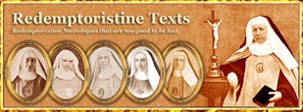
.jpg)









